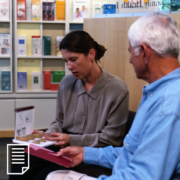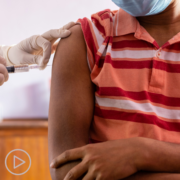How to Play an Active Role in Your Prostate Cancer Treatment and Care Decisions from Patient Empowerment Network on Vimeo.
What steps can you take to engage in your prostate cancer treatment and care decisions? Dr. Atish Choudhury discusses current and emerging prostate cancer therapies, reviews key treatment decision-making factors, and shares advice for self-advocacy.
Dr. Atish Choudhury is the Co-Director of the Prostate Cancer Center at Dana-Farber/Brigham & Women’s Cancer Center.
Learn more about Dr. Choudhury here.
Download Guide
See More from Engage Prostate Cancer
Related Resources
Transcript:
Katherine:
Hello, and welcome. I’m Katherine Banwell, your host for today’s webinar. Today, we’re going to explore the goals of advanced prostate cancer treatment and discuss tools for playing an active role in your care decisions.
Before we get into the discussion, please remember that this program is not a substitute for seeking medical advice. Please refer to your healthcare team about what might be best for you. Joining us today is Dr. Atish Choudhury. Dr. Choudhury, welcome. Would you please introduce yourself?
Dr. Choudhury:
Hello. Thank you so much for the invitation. So, I’m a medical oncologist at Dana-Farber Cancer Institute, and I’m the codirector of the prostate cancer center at the Dana-Farber/Brigham and Women’s Cancer Center. And I serve as the chair of the Lank Center for Translational Research as well, and ’t’s my pleasure to be here.
Katherine:
Thank you so much for taking the time out of your schedule to join us. Today, we’re talking about advanced prostate cancer.
What exactly does “advanced” mean in terms of this cancer?
Dr. Choudhury:
Yeah. So, it’s actually a pretty broad term, and it can mean different things in different contexts. But generally, what it means is that it’s cancer that has extended outside of the confines of the boundaries of the prostate itself – either locally where it is into the surrounding fat around the prostate capsule or to local lymph nodes, where it could also spread to other parts of the body – like lymph nodes, bone, and other organs.
So, it can really mean different things depending on the context.
Katherine:
Before we get into the types of treatment available, let’s start by understanding the goals of treatment. What are the goals of advanced stage prostate cancer?
Dr. Choudhury:
So, in general, the goal of treating any cancer is to a live a long, happy, healthy life with limited quality of life troubles from the cancer itself or its treatments. And so, for localized prostate cancer, that generally means treating with curative intent – that we give radiation or surgery, potentially in combination with hormonal treatments so that the cancer is taken care of and people can be cured and not need further treatments moving forward at all.
And there are situations, even in fairly advanced cases, where that’s a reasonable and accomplishable goal. And there are other situations that we might not be able to cure the cancer completely, but the treatments can be quite effective at keeping it under control and keep people with a very good quality of life so that prostate cancer is not a day-to-day burden for them and that they can survive with cancer for years, and years, and years.
Katherine:
It sounds like these goals would be determined with members of your healthcare team. So, who is typically on a patient’s prostate cancer healthcare team?
Dr. Choudhury:
Yeah. So, generally, the consultations here at Dana-Farber are multidisciplinary, with a medical oncologist, a radiation oncologist, and a urologic oncologist – so, a surgeon.
And so, if a patient is a good candidate for treatment to the prostate itself, then certainly, the surgeon and the radiation oncologist will talk about those treatments. And if the treatment is primarily with medications, then the medical oncologist will generally sort of take the lead. But there is often a role for local treatment to the prostate itself, even in cancer that’s spread beyond the prostate. So, that’s why the multidisciplinary consultation is so important.
Katherine:
Right. What do you feel is the patient’s role as a team member?
Dr. Choudhury:
Absolutely. So, I think it is very important for the patient to make sure that they come into these multidisciplinary meetings with questions around “What is my stage?” “What are the choices?” “What do I expect with treatment? Without treatment? With the various treatment options?” And basically, to take in the advice that they’re getting from the different members of the multidisciplinary team, and really think about how that’s impactful for them and their goals for themselves and what they really hope for the short term and for the long term.
I think what gets tricky is that there’s really very not-great sources of information that’s out there online and in YouTube videos and things like that, and I think it does play an important role for the patient to really understand what are the real high-quality sources of information – they tend to come from academic medical centers like ours. And certainly, we do encourage second opinions at other high-quality, high-volume centers so that the patients understand that the recommendations that are being made are generally made based on the based data and with people with a lot of experience at treating their kind of cancer.
Katherine:
What about caregivers? How do they fit into the team?
Dr. Choudhury:
Caregivers are critical because patients are not always the most expressive at, really, what their wants, and needs, and desires are. And especially when they’re on treatment, sometimes they’re not so expressive around the things that are bothering them on a day-to-day basis.
So, the caregivers are really important for communication with us to be kind of another set of eyes and ears in terms of kind of reporting what the patient’s symptoms are or what their goals or desires are that maybe they themselves don’t feel comfortable expressing. But they also play an important role in helping us with, kind of, lifestyle recommendations to the patient. Because certainly, much of the process of doing well with prostate cancer treatments is kind of lifestyle modifications – makes sure you’re eating healthy, exercising regularly – and the caregivers can play a very important role in making sure that patients stick to that kind of regimen as well.
Katherine:
I would think one of the issues for a patient too is that just having a cancer can be overwhelming and can make it difficult for them to even remember all the questions and concerns that they have.
Dr. Choudhury:
Yeah, that’s absolutely critical, and the caregivers play a very important role. So, often, people who are not partnered, for example, will just bring a friend to these appointments just to be that second set of eyes and ears.
Katherine:
Dr. Choudhury, we received this question from an audience member prior to the program: What is palliative care?
Dr. Choudhury:
So, palliative care is really a branch of medicine that helps with symptom management. And so, that symptom management doesn’t necessarily have to be end-of-life sort of symptoms relating to death and dying. It can be just along the way to help with managing the symptoms related to cancer and its treatment, but also to be kind of another medical provider to help with communication of goals of care – what’s really bothersome, what’s really important – so that we kind of incorporate those wishes and desires into the management decisions that we make.
So, a patient does not have to be at end-of-life to engage with palliative care. Certainly, even earlier engagement with palliative care can be helpful to maximize quality of life along the treatment journey. But as symptoms become more bothersome, certainly, our palliative care colleagues can be incredibly helpful – not just in helping manage pain, but also nausea, also depression and psychological side effects. So, they’re a really critical part of our treatment team.
Katherine:
Yeah. I think we have a pretty good understanding and the goals of treatment. So, let’s walk through the types of therapy that are used today to treat prostate cancer.
If you would start with surgery?
Dr. Choudhury:
Sure. So, surgery is a radical prostatectomy, and they take out the prostate – they take out neighboring structures called seminal vesicles, they take out the surrounding fat, and they’ll usually take out some neighboring lymph nodes as well. And there are advantages of surgery in that when the prostate is out, the pathologist can examine the whole prostate front to back, side to side, as well as those neighboring structures to really understand the stage of the cancer – “Where is it?” – and also, the grade – “Is it a high-grade cancer, a low-grade cancer, somewhere in the middle?”
And it really helps guide “What is the risk of developing recurrence afterwards, and are there further treatments that we should be giving after the surgery? For example, radiation to the prostate bed to decrease the risk of recurrences. Surgery does have its own set of potential side effects and complications, so it’s not appropriate for everyone, but in general, that’s the process.
Katherine:
What other treatment options? You mentioned radiation. What else is there?
Dr. Choudhury:
Yeah, so, radiation comes in two forms: there’s seed radiation, which is implantable little radioactive pellets that are implanted throughout the prostate. And then, there’s external radiation, and that can be given in several forms and over several schedules that it’s really important to discuss with the care team.
The other forms of treatment that people on this call might’ve heard about or read about are in a category called “focal treatments,” and these are basically ways to – and the term we use is a blade but zap – an area of the prostate using lasers, or high-intensity ultrasound, or with freezing an area of the prostate, or with something called “irreversible electroporation.”
These are basically all ways to, again, zap an area of the prostate either with heat or with cold with the intention of killing off cancer cells in an area. And the trouble is that none of these treatments have actually been demonstrated to improve outcomes related to prostate cancer compared to just surveillance alone. And it does complicate, sort of, the monitoring afterwards to see if something has come back.
But there might be very selected patients where there’s an area of cancer that’s seen on a scan – like an MRI – with no cancer seen outside of that area who might decide to pursue this possibility of focal treatment with the goal of maybe putting off the need for something like radiation or surgery. But that’s something that really should be discussed with a multidisciplinary team so that people really understand what they’re getting into in terms of risks and potential benefits.
So, those treatments are not really considered standard at this time.
Katherine:
What about hormonal therapy?
Dr. Choudhury:
Yeah, so, hormonal therapy plays a role in the treatment of prostate cancer, really depending on the stage and the other treatments that are being considered. So, for example, if a patient is going to surgery for a localized prostate cancer, in general, we wouldn’t use hormonal treatment either before or after the surgery unless they’re planned for radiation after the surgery.
However, for patients who have intermediate risk or higher localized prostate cancer and are getting radiation, then we will often recommend hormonal treatments, which are basically testosterone-lowering drugs, to make the radiation work as well as possible. And then, for patients who have advanced cancer beyond where surgery or radiation is going to be of help, then, hormonal treatments are important to treat the cancer wherever it is.
And that’s because prostate cancer cells, wherever they are in the body – wherever they’re in the prostate itself, or in lymph nodes, or bones, or other organs – depend on the testosterone in your body to supply a fuel – to support its growth and survival.
And so, lowering the level of testosterone in the body basically deprives the cancer cells of that fuel and starts a process of killing cancer cells even without any need for radiation, or chemotherapy, or things like that. However, hormonal treatments are not curative. They don’t kill all the cancer – they kill some and put the rest to sleep. And so, if you stop the hormonal treatment, the cancer will grow back, and that’s why it’s not a treatment on its own for localized prostate cancer.
And that’s also why, for prostate cancer that’s spread, we often add on additional medications to the testosterone-lowering drugs to be more effective at really killing the cancer wherever it is compared to the testosterone suppression alone.
Katherine:
Oh, I see. For advanced disease, what treatments are available for patients that are hormone-sensitive or -resistant?
Dr. Choudhury:
Yeah, so “hormone-sensitive” means that the cancer has advanced, but the patient hasn’t started on testosterone-lowering drugs yet. And so, as I had mentioned, testosterone lowering is really the backbone of treatment of these patients. And so, there are additional treatments that have been demonstrated previously to be effective after testosterone-lowering by itself stops working, and these include a chemotherapy drug called docetaxel. And in addition, there are more potent hormonal drugs called abiraterone, enzalutamide, apalutamide, and darolutamide.
And the role of these other drugs is to block hormonal signaling within the cancer cells from hormones other than testosterone. And so, by doing the more potent hormonal drug in conjunction with the testosterone lowering, that leads to a much deeper response – much more tumor shrinkage – and, it turns out, also prolonged survival in patients treated with those combination treatments – compared top people who are treated with testosterone lowering alone and then receive these drugs later.
So, there’s something about treating more aggressively at the beginning in this hormone-sensitive state that plays out in prolongation of survival. And not only prolonged survival, but improved quality of life due to delaying the symptoms of cancer grown and progression.
Katherine:
Right.
Dr. Choudhury:
When we then talk about castration resistant disease, certainly we use the same classes of drugs, but then, there’s a wider armamentarium of things that we use that include, again, other kinds of chemotherapy.
There are radiation drugs, and an approved drug Radium-223. And there’s another drug on the horizon called Lutetium PSMA. There are immune therapy drugs – something called Sipuleucel-T – and then, this is also a situation where we do genetic testing of the cancer to understand if there’re certain –what we call “therapeutic vulnerabilities.”
Other treatment options that are available based on the genetics of the cancer that might be helpful in some people? And specific options include a chemo-immune therapy called “Keytruda” in a small subset of patients with particular genetic changes involving genes involved in mismatched repair of DNA. And then, there’s another set of targeted treatments called “PARP inhibitors” for certain sets of patients who have alterations in genes involved in homologous recombination repair of DNA.
So, that’s all very complicated, and so that’s why it’s important to get treated with high-volume providers of prostate cancer patients so that they’re really aware and onboard with these various treatment options that are available.
Katherine:
Yeah. Where do clinical trials fit in?
Dr. Choudhury:
So, clinical trials can fit in anywhere along the treatment trajectory for prostate cancer. It’s not something that’s reserved for kind of late-stage disease. So, for example, for people with localized disease, there are different types of treatment strategies that might be available to maybe enhance the activity of the surgery or the radiation that’s planned. And so, we might consider a clinical trial even for localized prostate cancer.
And then, anywhere along the way, there are standard treatments that are available, and then, there are some experimental approaches that might be available. And the experimental approaches might be to add an additional drug to the standard or to actually – what we call “deescalate treatment” – give a little bit less of the medication and see if the outcomes are the same. And these are tests.
And so, the control arm, when there’s a randomized trial, is generally considered a standard of care. And then, the experimental arm is some alteration or deviation from that standard. But many of our trials are also single-arm trials where we’re testing some experimental regimen that all patients who participate in the trial will take part in, and it’s really important for the patient to ask, “What are the clinical trials available?” “What are the alternatives as far as standard treatments?” and “Are there other clinical trials other than the one that’s being discussed,” that might be appropriate for them?
Katherine:
Are there emerging approaches that patients should know about?
Dr. Choudhury:
Yeah. So, a lot of the emerging approaches are related to the genetics of the prostate cancer, as I just mentioned. And then, these different forms of radiation drugs – in addition to the ones that have already demonstrated survival advantage, there are other ones in the pipeline. And then, one thing that patients are very curious about is immune therapy approaches to prostate cancer.
Now, the standard kind of immune therapy drugs that are approved for lung cancer, and melanoma, and kidney cancers don’t tend to work particular well for prostate cancer. But there are many clinical trials trying to combine those kinds of drugs with other drugs or have newer approaches to immune therapies that patients with advanced cancer can certainly ask about.
Again, all of this is really experimental, and people need to understand that these sorts of approaches aren’t going to help everyone. But participating in a clinical trial allows our patients to contribute to knowledge that can be useful for other patients down the line.
Katherine:
Right. Now that we’ve delved into the types of treatment, let’s talk about what goes into deciding on an approach. What do you typically consider when determining the best treatment approach or option for a patient?
Dr. Choudhury:
So, the starting point and the ending point is the patient themselves. And so, “the patient” means “What is their age? What is their fitness level? What are their activities? What’s the overall life expectancy? What are there other medical issues?” And then, we consider the cancer – “What is the stage? What is the grade? Where has it spread to, if it’s spread?”
And then, we try to incorporate all of those pieces with data – with clinical trials that have already been reported – and we have a lot of data in prostate cancer from patients who’ve participated in clinical trials, often randomized to one approach versus another, that gives us a sense of “What are the approaches that really benefit patients in terms of increasing likelihood of cure or prolonging the survival?”
And so, once we incorporate all of those things, we can come up with some treatment suggestions, and then patient preference on those suggestions obviously plays a very important role. But sometimes, we start down a line, and the patient is having troublesome side effects or it’s not working as well as we’d really hoped, and it’s important to be adaptive and to change things if things are not going down a route that we’d really hoped. So, that’s an ongoing conversation. It’s not that you make a treatment plan at the first visit and that’s the plan that’s stuck with throughout the whole course of things.
It’s a conversation at every visit on how things are going in terms of how the patients are doing and how the cancer is responding. And then, again, try to manage side effects as well as we can and adjust things if we need to along the way – and maybe switch to something that’s potentially going to be better tolerated or more effective, depending on what we see.
Katherine:
Right. It sounds like there are many factors to weigh when making this decision. I’d like to address a list of common concerns about treatment that we’ve heard from the community. So, I’d love to get your take on these. “There’s nothing that can be done about advanced prostate cancer.” Is that true?
Dr. Choudhury:
So, that is very much untrue in that even patients with pretty advanced prostate cancer – even what we call “high-volume” kinds of prostate cancer – can live for years, and years, and years with appropriate treatments.
And the concern, oftentimes, is that the way that we get those years, and years, and years are with treatments that lower levels of testosterone, and I’m guessing that some of your questions coming up are related to concerns around side effects of treatment. But many of our patients tolerate those side effects pretty well and can live quite a good, and vigorous, and fulfilling life even with pretty advanced prostate cancer.
Katherine:
The next one: “Clinical trials are a last-resort treatment option.”
Dr. Choudhury:
Yeah, so, as I’d mentioned before, clinical trials can be appropriate anywhere along the treatment trajectory of prostate cancer, and they are often being compared against standards which are often pretty good, but can we make them better? And certainly, participating in clinical trials isn’t for everyone, but for a long of our patients who are interested in seeing if an experimental approach might be beneficial to them or contributing some knowledge to patients down the line really do find trial participation to be quite fulfilling.
Katherine:
All right. The next one is: “Prostate cancer isn’t genetic, so I don’t need to be tested.” Is that the case?
Dr. Choudhury:
No. So, it turns out that prostate cancer is actually one of our most heritable cancers. Somewhere between 40% and 50% of the predisposition to prostate cancer is actually genetic, or inherited based on family. So, the part that’s tricky and the part that is hard to maybe explain to patients is that a lot of that heritability is not encompassed in particular cancer genes in the way that many people are familiar with with breast and ovarian cancers, which are often linked to genes called “BRCA-1” and “BRCA-2.” So, a small subset of patients with prostate cancer do have alterations in that BRCA-2 gene, or BRCA-1, or ATM, or some other genes involved in breast and ovarian cancers.
And that does impact, potentially, their treatments down the line, and certainly is impactful for themselves, their siblings, their children as far as, potentially, screening recommendations for other cancers. But oftentimes, we’ll do one of these tests in patients who have a pretty extensive family history of prostate cancer, and they come out negative, and the patient is very confused because they clearly have a family history, but it’s because not all the risk of prostate cancer is actually encompassed in these gene tests that we run.
Katherine:
Ah, okay. The next concern is “I’ll lose all sexual function when I receive treatment.”
Dr. Choudhury:
So, it very much depends exactly what the treatment is, and what’s being offered, and what the recovery is like.
So, for example, for patients who go into a prostatectomy and have very good erectile function, it’s not inevitable that you’ll lose your sexual functioning after a prostatectomy. There is a process – we kind of refer to it as “penile rehab” – of using medications like a Viagra or Sialis to restore the blood flow. You could use certain things like vacuum pump devices to restore the blood flow, and again, it’s not inevitable that people are going to lose their sexual functioning after a prostatectomy.
Even with testosterone suppression, while it plays a role in libido and erectile function, it’s not inevitable that people lose their libido and erectile function completely, even on these drugs. But certainly, more often than not, people will lose their erectile function on testosterone-lowering medications.
And so, there are alternative ways to get erections – involving, again, use of vacuum pump devices or injections that people can give themselves into the penis. People can have penile implant surgery to be able to get erections that way. And so, it’s really dependent on what the situation is.
Again, none of those more mechanical interventions are really ideal, but particularly when people have a defined course of treatment – for example, a surgery or radiation with a brief course of hormones – people can recover erectile function even after those sorts of interventions. And if they can’t, then we do have other approaches that will allow people to still be able to be sexually intimate with their partner after all of the treatments are completed.
Katherine:
Dr. Choudhury, one more concern: “My symptoms and side effects can’t be managed.”
Dr. Choudhury:
Yeah. So, again, it’s very rare that we run into situations where there are side effects or symptoms that can’t be managed at all, in the sense that we have very effective medications against hot flashes, or moodiness, or pain, or –just fatigue. And certainly, lifestyle plays a big role in this. Also, a lot of the symptoms that people express are related to underlying depression and anxiety issues, and certainly, engaging with a mental health provider can be helpful in terms of managing those as well.
And then, there’s a lot of nonpharmacologic treatments – meaning nonmedication approaches that can provide people a lot of benefit in terms of their quality of life, and we have an integrative center called the Zakim Center for Integrative Medicine that helps with the relaxation techniques, and massage, and yoga, and acupuncture…
And people find different approaches to help manage these symptoms and side effects. And so, it’s very unusual where we run into a situation where the side effects are unbearable and unmanageable. Usually, we can manage them in some form of way that allow people to have, again, a good quality of life and a meaningful life, even on prostate cancer treatment.
Katherine:
Thank you, that’s really helpful. I’d like to talk about the term “shared decision making.” What does that mean to you, exactly?
Dr. Choudhury:
So, shared decision-making really means that when the physician conveys information to a patient, that the patient really understands what’s being said, and what, really, the alternatives are – and the real risks and the benefits of the different alternatives. And so, if a patient goes to see a surgeon and they say, “Well, we should take this out,” and there’s never really discussion of what the risks and benefits of the alternatives are –and the alternatives could be just watching, or radiation, or even more intensive treatment, then that’s not really shared decision making.
But what I think is not exactly shared decision making is when the patient is getting information from really non-knowledgeable or non-reputable sources and then starts to come up with conclusions based on hearsay or people trying to sell them a product that really hasn’t been FDA approved or really tested. And so, those are situations where when the information is really not good, then we can run into troubles with communications. But there are a lot of really excellent sources for patient information that’s available, and the Prostate Cancer Foundation is a really good source, and a lot of the academic prostate cancer centers are really great sources of information.
And so, being educated and asking good questions is really the best way for a patient to feel comfortable that they’re not missing anything and that they’re, again, having all the information that they need to make a good choice for themselves.
Katherine:
Do you have any advice to help patients speak up if they’re feeling like they’re not being heard?
Dr. Choudhury:
Sure. So, I mean, there’s never any barrier to bringing up concerns with whoever that you’re seeing, and if you feel like whoever you’re talking to isn’t being receptive to those concerns, then certainly, second opinions are very useful. But if you see multiple doctors and they’re kind of telling you the same thing based on good evidence, then you probably have to take in what they’re saying, and process it, and see if it really does apply to your particular situation.
But any cancer doctor who really has your self-interest in mind will be very open to discussing the concerns that you have, so you should absolutely bring them up.
Katherine:
To close, Dr. Choudhury: What would you like to leave the audience with? Are you hopeful?
Dr. Choudhury:
Yes. I’m actually incredibly hopeful. There’s been such a transformation in our diagnosis and management of prostate cancer compared to when I first started as an independent attending back in 2012. In the last ten years, there’s been so many new treatments that’ve been approved in the last decade and a lot of newer technologies available for staging patients – really finding where their prostate cancer is.
And newer technologies for treating the cancer wherever it is and in a really smart way. And so, we can really individualize our treatments for the patient that’s in front of us being a bit more intensive for people with higher-volume or higher-risk cancers, and actually potentially being able to back off treatment, and actually stopping some of the testosterone-lowering drugs in patients who are responding exceptionally well to the medications and the local treatments that we’re giving them.
And then, also, I’m really hopeful about the newer treatments and newer technologies that are on the horizon. We have newer – what we call “molecularly targeted agents.” We have new approaches involving immune therapies that are being tested – newer radiation approaches. And I feel like all of this put together allows us to, again, satisfy the goal of maintaining patients’ good, healthy, meaningful quality of life moving forward.
Katherine:
Yeah. Dr. Choudhury, thank you so much for taking the time to join us today.
Dr. Choudhury:
Oh, you’re welcome. It’s so wonderful to have this opportunity.
Katherine:
And thank you to all of our partners. Please continue to send in your questions to Question@PowerfulPatients.org, and we’ll work to get them answered on future programs. To learn more about prostate cancer and to access tools to help you become a proactive patient, visit PowerfulPatients.org. I’m Katherine Banwell. Thanks for being with us today.
























